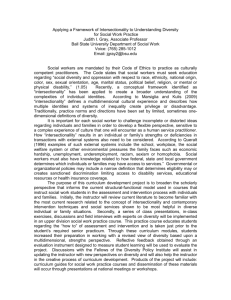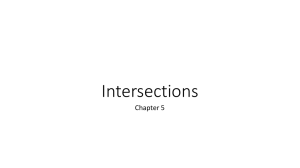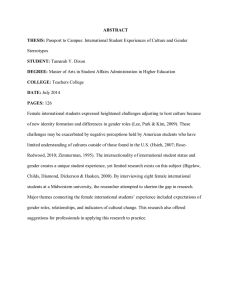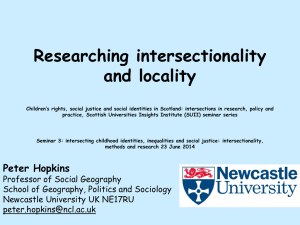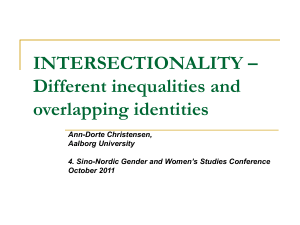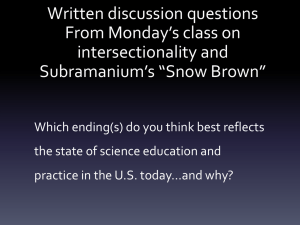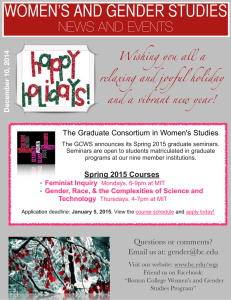Influences, Interrogations and Innovations Intersectionality Research, Policy & Practice: Conference Schedule
advertisement
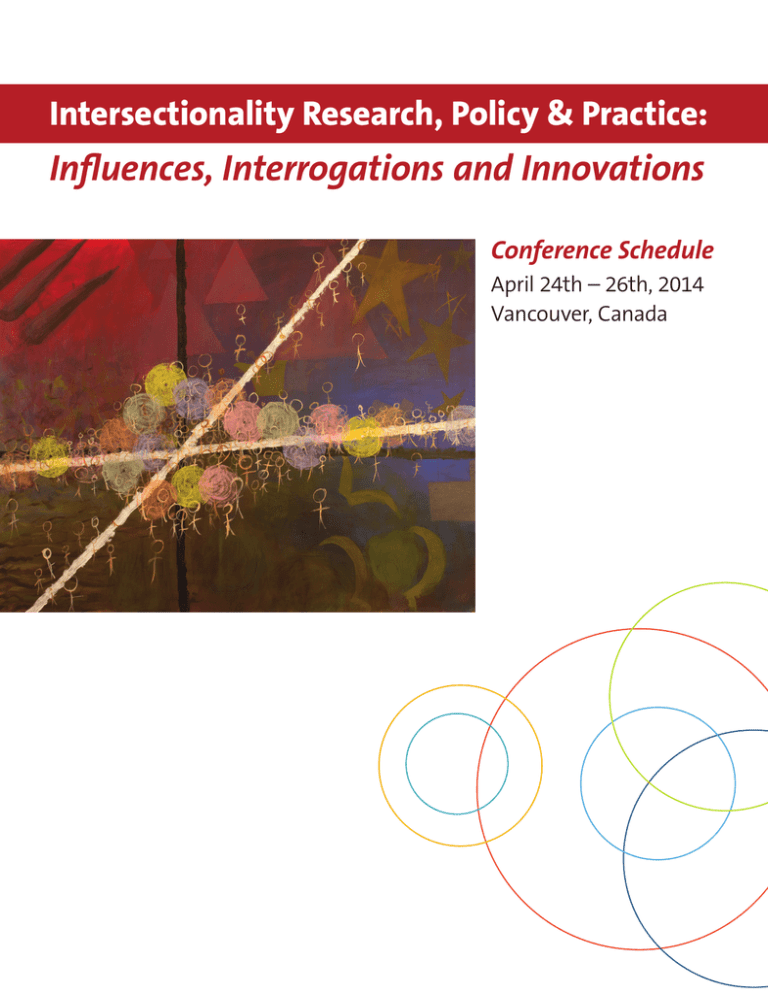
Intersectionality Research, Policy & Practice: Influences, Interrogations and Innovations Conference Schedule April 24th – 26th, 2014 Vancouver, Canada Schedule at a Glance Thurs. April 24th Sat. April 26th Pre-conference workshops: 1. Intersectionality-Based Policy Analysis Framework (9-2pm) – featuring Julia Jordan-Zachary (Providence College) 2. Indigeneity and Intersectionality (2-5pm) – featuring Manulani Meyer (University of Hawaii) and Leanne Simpson (Writer, scholar, storyteller and activist of Michi Saagiig Nishnabeg ancestry and a member of Alderville First Nation) 8:45 – 9:00am (Segal Centre 1400-1430) Elder Welcome Conference Welcome Opening Evening: OPEN AND FREE TO PUBLIC (6-9pm, Chapel Arts Community Centre, Vancouver) Featuring Keynote Patricia Hill Collins (Distinguished University Professor, Sociology, University of Maryland): “Toward Social Justice: Sharpening Intersectionality's Critical Edge” & Intersectionality Art Exhibit (curated by Alana Boltwood, Toronto-based intersectionality artist) Fri. April 25th 8:30 - 9:15am (Segal Centre 1400-1430) Elder Welcome & SFU All-Nation Drummer Performance Conference Welcome (SFU President Petter) Conference Coordinator Address (Dr. Olena Hankivsky) Introduction to ‘Principles of Engagement’ for Conference (Dr. Lynn Weber) 9:15 - 10:45am (Segal Centre 1400-1430) OPENING KEYNOTE PANEL: "INTERSECTIONALITY: WHERE WE HAVE BEEN, WHERE WE ARE NOW " Participants: Rita Dhamoon (Department of Political Science, University of Victoria) Ange-Marie Hancock (Political Science and Gender Studies, University of Southern California) Jessica Danforth (Executive Director, Native Youth Sexual Health Network) Moderator: Ruth Zambrana (Women’s Studies, University of Maryland) 10:45 - 11:00am – BREAK 11:00 – 1:00pm – BREAKOUT PAPER SESSION 1 (details on page 1) 1:00 – 2:45pm – MENTOR/MENTEE LUNCH 2:45 – 4:30pm – BREAKOUT PAPER SESSION 2 (details on page 2) 9:00 - 10:45am (Segal Centre 1400-1430) MORNING KEYNOTE PANEL: "INSTITUTIONALIZING INTERSECTIONALITY" Participants: Meike Verloo (Faculty of Social Sciences, Radoud University Nijmegan) Lynn Weber (Psychology, University of South Carolina) Manulani Meyer (University of Hawaii) Beth Jackson (Government of Canada) Moderator: Olena Hankivsky (School of Public Policy, SFU) 10:45 - 11:00am – BREAK 11:00 – 12:45pm – BREAKOUT PAPER SESSION 3 (details on page 4) 12:45 – 1:30pm – NETWORKING LUNCH 1:30 – 3:30pm – WORKSHOPS/COLLOQUIA/ROUNDTABLES (details on page 5) 3:30 – 3:45pm – BREAK 3:45 – 5:30pm (Segal Centre 1400-1430) CLOSING KEYNOTE PANEL: "INTERSECTIONALITY RESEARCH AND PRACTICE: CHALLENGES AND POSSIBILITIES" Participants: Elizabeth Cole (Women’s Studies, University of Michigan) Ruth Zambrana (Women’s Studies, University of Maryland) Lisa Bowleg (George Washington University) Moderator: Julia Jordan Zachary (Providence College) Note: In-person registration for conference will be available: Thursday April 24th (6-8pm, Chapel Arts) and Friday April 25th (8-9am, SFU Harbour Centre). Online registration available at: http://www.sfu.ca/iirp/conference/registration.html. Tweet us with #intersectSFU 7:00 – 8:30pm (Segal Centre 1400-1430) EVENING KEYNOTE PANEL: “COALITIONS, SOCIAL MOVEMENTS, RESISTANCE” Participants: Celeste Montoya (Women and Gender Studies, University of Colorado at Boulder) Bethany Stevens (Sexologist & Disability Consultant, Atlanta) Leanne Betasamosak Simpson (Writer, scholar, storyteller and activist of Michi Saagiig Nishnabeg ancestry and a member of Alderville First Nation) Moderator: Lynn Weber (Psychology, University of South Carolina) 8:30 – 9:15pm EVENING PERFORMANCE: Splinter Theatre Group (‘Dance for Social Change’) Cover: Axes of Power by Alana Boltwood Presentation Schedule & Details Friday April 25th 11:00am – 1:00pm — Breakout paper session 1 Flesh Biology and the Body Room 1315 Discussant: Bethany Stevens bethany.stevens@gmail.com Community, Activism and Social Change Room 1415 Discussant: Celeste Montoya celeste.montoyakirk@colorado.edu Education Room 1600 Discussant: Jennifer Marchbank jmarchba@sfu.ca Ways of Knowing: Indigenous Epistemologies and Methodology Lesley Tarasoff “Feminist Disability Studies and Intersectionality in Conversation: The Example of Physically Disabled Women during the Perinatal Period” Cynthia Bateman “Gestation Crates as Political Apparatus: Notes Towards an Affirmative Intersectional Study of Bodies at Risk” Marta Infante “Educational Inclusion: The Body as an Intersection of Multiple Oppressive Contexts” Huai Bao “When Theatre and Biology Intersect: Cases of Cross-Gender Performers’ Gender Identity Disorder in Childhood” Doris Rajan “An Intersectional Community Development Approach to Addressing Violence & Health” May Farrales “Unpacking Filipino Canadian Sexual Subjectivities in Transnationalism and Settler Colonialism” Willeen Keough & Cecily Nicholson “The Social Housing Coalition of BC: Re-Appropriating Intersectionality for Social Action” Krista Lauren Craven “Boundary Politics: An Intersectional Approach to Understanding the Political Activism of Undocumented Immigrant Youth” Manjeet Birk “We are All the Same: Dynamics within the ‘Colourblind’ Peer Review Group” Connie Guberman “From Harm to hope: Intersections of Gendered Expectations on Student’s Experience of Violence” Rachelle Brunn “Race, Class, Gender and Achievement at Selective Colleges and Universities” Jillian Deri “Jealousy through the Lens of Intersectional Emotions” Jade Boyd “Considering Creativity as a Tool in Intersectional Research Methodology” Karen Robson “Using Intersectionality to Understand Post-Secondary Pathways of Marginalized Groups” Cameron Mckenzie “Navigating Post Secondary School with a Learning Disability: The Pursuit for Accommodations” Natalie Clark and Dory Nason “Indigenous Intersectionality, Red Intersectionality, Red Feminism and Beyond” Room 1425 Discussant: Manulani Meyer manulani@hawaii.edu Intersectional Investigations across the Life Course Room 1520 Discussant: Wendy Hulko Whulko@tru.ca Dilek Kayaalp “A Critical Analysis of Research on Immigrant Youth: “Value-Free” Science Versus the Realities of Immigrant Youth” Nathalie Lozano-Neira, with youth Diego Cardona “Building Bridges: Intersectional Research Approaches with Newcomer Youth” Fritz Pino “Looking through Intersectionality: Experiences of Racialized Elderly LGBTs in Canada” Kate Butler “Negotiating Citizenship: Intersectionality as Perspective in Research with Marginalized Youth” Stella Palikarova “The Hours Before “Goodbye”” Dilek Kayaalp “Schooling of Immigrant Youth in Canada: A Sociological Analysis” 1 FRIDAY APRIL 25 11:00AM - 1:00PM – BREAKOUT PAPER SESSION 1 Research Challenges And Opportunities Room 3000 Discussant: Ruth Zambrana Sheryl Kirkham & Sonya Sharma “Lost Meaning? Examining the Salience and Challenges of Incorporating Religion into Intersectional Analyses” c/o Wendy Hall: hallw@umd.edu Laurie Nsiah-Jefferson “Developing a Measure of Gendered Racism and Generic Stress for Black Girls” Population Health Research Beth Jackson “Monitoring Health Inequities through Quantitative Intersectionality Analysis” of Inequities Room 1400 Discussant: Lisa Bowleg lbowleg@email.gwu.edu Gretta Bauer “Challenges to Incorporating Intersectionality Theory in Population Health Research: Quantitative Language vs. Quantitative Methods” Deborah Stienstra “Using Intersectionality to Make Children and Youth with Disabilities Visible” Lee Maclean “Two Kinds of Intersectional Effects” Natalia Rocha-Lawton “Power Relations and Dominant Identities: Beyond Intersectional Analysis” Hasu Ghosh “Identifying the Promises of an Intersectional Approach for Advancing Indigenous Population Health Research” Setareh Rouhani, Olena Hankivsky, & Anna Vorobyova “An Intersectional Examination of Health Inequities in Post-Soviet Ukraine’s Healthcare System” Annette Browne “What does Intersectionality Suggest about Population-Level Measurement of Discrimination?” Olivier Ferlatte & Terry Trussler “Wrestling with the Gorgon: Intersectionality in Survey Research on Gay Men’s Health” 2:45pm – 4:30pm — Breakout paper session 2 Art/Performance Room 3000 Discussant: Jade Boyd jadeb@sfu.ca Decolonizing Methods Room 1600 Health Room 1315 Discussant: Olena Hankivsky oah@sfu.ca 2 Carlo Sayo “Place-Making in the Shadows: The Visual Culture of Filipino Settlement in Vancouver” Gul Caliskan “Intersecting Narratives of Crossing the Line: Artistic Expressions of Gezi Park 2013” Catherine Flynn “Street-Involved Young Women against Structural Violence: An Intersectional Analysis of an ArtBased Action-Research” Venge Dixon & Seema Shah “The Art in Her Illness: A Creative Example of Intersectionality” Beenash Jafri, Jen Preston & Fenn Stewart “Questioning Intersectionality in Settler Colonial Contexts” Jeannine Girard-Pearlman “Redefining the Determinants of Health in Medical Curricula using Intersectional Lenses” Omolola Taiwo “US Health Care Reform: An Intersectional Approach to Evaluating the ACA and its Impact on Marginalized Populations” Jenny Douglas “Cigarette Smoking and AfricanCaribbean Young Women in the UK: Intersections of ‘Race’, Ethnicity, Gender, Class and Tobacco” Janine Farrell “A Critical Framework for Understanding Trans* Health and Wellness” Patrick Grzanka & Jenny Dyck Brian ““Analytic Dispositions” and the Shared Affinities of Intersectionality and Science & Technology Studies” FRIDAY APRIL 25 2:45PM - 4:30PM – BREAKOUT PAPER SESSION 2 Public Policy And Organizational Studies (1) Room 1425 Discussant: Mieke Verloo m.verloo@fm.ru.nl Social Justice And Advocacy Room 1415 Discussant: Ange-Marie Hancock ahancock@usc.edu Violence/Trauma Room 1520 Discussant: Katherine Rossiter rossiter@sfu.ca Methods Room 1400 Discussant: Elizabeth Cole ecole@umich.edu Laurie Nsiah-Jefferson “Intersectionality in Public Policy and Organizational Studies: Pedagogy, Curriculum Development and Collaborations” Nikki Tishler, Carmen Hicks & Nicole Rodriguez “Using Intersectionality in Municipalities: Discourse, Frameworks and Application” Mary-Antoinette Smith “Intersectionality and the Creation of Beloved Community Deep Dialogues” Wendy Aujla “Conceptualizing Honour Killings in Canada” Michelle Deming “The Sexual Victimization of Women: The Intersections of Race, Class, Gender, And Sexuality” Jemma Tosh “Childhood Sexual Abuse, Transgenderism, and Intersexuality: A Critical Intersectional Analysis of Psychiatric Theory and Treatment” Sana Shahram “Charting Intersectional Relationships in the Context of Life Experiences with Substances (C.I.R.C.L.E.S)” Gender and Sport Room 3051 Discussant: Colleen Reid reidc@douglascollege.ca Zahra Rad “Muslim Women in Sports Arenas” Lisa Bavington “Sex Testing in Women’s Sport: An Intersectional Analysis” Leah Levac & Ann Denis “Women, Intersectionality, and Changing Public Services in Canada” Irene Ryan “Views from the Top and Below: An Exploration of What Intersectionality Offers CrossSectoral Research” Rebecca Lambert “An intersectional liaison? Using Intersectionality to design missionbased programming in social justice organizations and exploring the organization as a liaison between academic theory and activist praxis” Sobia Shaikh “Institutional Ethnography and Intersectionality: Ontological Disjuncture or Disruption?” Critical Examinations of Francesca Scala & Stephanie Paterson “‘Doing’ Intersectional Analysis: Representation and Displacement through Gender-Based Analysis in Canada” Aoife Emily Hart “Marriage Equality is not a Transgender Issue: Queer Divisions in the Human Rights Commission as an LGB(T) Organisation” Presenter: Marianne Chbat (Marianne Chbat, Dominique Damant, Valérie Roy, Holly Johnson) “An Intersectional Feminist Program for Women Who use Violence” Karen Stote “Looking Back, Looking Forward: Settler Feminism, Indigenous Women, and Reproductive Justice for All” Sirma Bilge “Confronting the Undoing of Intersectionality within Disciplinary Academic Feminism” Presenter: Marianne Chbat (Dominique Damant, Marianne Chbat, Catherine Flynn) “Woman, First Nation Woman, Racialized Woman, Mother, Victim of Violence, Poor, Immigrant, Not Speaking French or English. Is one Oppression Worse than the Others? How do they Intersect?” Susan Meyers “Scared in Mexico: The WriterResearcher in the Transnational Migration Context” Nancy López “Contextualizing Lived Race-Gender and the Racialized-Gendered Social Determinants of Health” Ann Travers “Binary or Busted! Transgender and Gender Variant Children and Youth in Sport and Recreation” Jillian Weber “A ‘Triple Play’: An Intersectional Approach to Black Female Athletes” 3 Saturday April 26th 11:00am – 12:45pm — Breakout paper session 3 HIV/AIDS Room 1315 Discussant: Daniel Grace daniel.grace@lshtm.ac.uk Soraya Blot “Heterogeneity in Familiarity with, Willingness to Attend and Access to the Local AIDS Service Organization among African, Caribbean and Black Residents of Middlesex-London, Ontario, Canada” Gilbert Emond “Youth High Risk to HIV through Sex and Drugs Exploration” Alex Otieno “Global Forces, Local Action, and the Inclusion of Human Rights into Kenya’s Response to HIV/AIDS” Nathan Lachowsky “Unpacking Ethnicity: Effects of Different Classification Approaches in HIV Research in Aotearoa New Zealand” LAW Room 1425 Martin Cannon “Men, Masculinity, and the Indian Act in Canada” Discussant: Margaret Jackson margarej@sfu.ca LABOUR /EMPLOYMENT Room 3000 Discussant: Lynn Weber weberl@mailbox.sc.edu Bridget Hiedemann, Shandra Benito & Thomas Glassman “Intersections of Gender and Disability in the Labor Market: Decomposing the “Hearing Earnings Gaps” for Men and Women in the United States” Habiba Zaman, in collaboration with the Philippine Women Centre of BC “Academic Research and Racialized Community Activism: Exploring Intersectional Theory and Practices” MEDIA/ADVERTISEMENT/ FILM Room 1520 Discussant: Vivian May Room 2270 Discussant: Marina Morrow mmorrow@sfu.ca 4 Sarah Rudrum “Intersectional Power Dimensions and Coercive Care: A Compulsory Approach to Couples’ HIV Testing During Antenatal Care in Rural Northern Uganda” Kelly Hannah-Moffat "Intersectionality and the Reframing of the Criminalized Subject: Specialized Courts and the Unintended Consequence of Holistic Knowledge and Quasi-Legal Regulation" Vrinda Narain “Veiled Threats: The Place of the Niqab in the Courtroom: An Intersectional Approach to Understanding the Supreme Court’s Decision in R v NS” Maureen Kihika “Good Work!: Experiences and Identity Construction Processes of Black Female Care-Givers in Vancouver’s Labor Market” Sue Ressia “Uncovering Complexity in the Job Search Experiences of Skilled Immigrants in Australia: An Intersectional Approach” Beverly Baines “What Does Canadian Law Know About Intersectionality?” Ethel Tungohan “Evaluating ‘What’s Next’ when Thinking about Intersectionality: Can Intersectionality Bridge the Gap between Research and Activism?” Leigha Smith “Framing Experience: Intersectionality and Advocacy for Immigrant Women in British Columbia, 1968” Erica Jorgensen “Jezebel.Com, Reproductive Healthcare Access, and the War on Women: Exploring an Intersectional Force in the Months Preceding the November 2012 U.S. Elections” Jessica Posega “An Image is Worth a Thousand Words of Oppression: An Anthropological, Intersectional Analysis of a Photograph of a Ghanaian Maternal Health Advertisement” Linda Gregory “Enhancing Nursing‘s Workforce: Mentoring Diverse Graduate Students toward Professional Development, Academic Success, and Psychological and Emotional Well-Being” Carla Hilario “If you’re not like everyone else you get picked on”: Using intersectionality to interrogate bullying as a social practice” Gemma Hunting, Daniel Grace, & Olena Hankivsky “Promoting Social Inclusion for People Experiencing Substance Use and Mental Distress in BC: An Alternative IntersectionalityInformed Model” vmmay@syr.edu MENTAL HEALTH Joseph Rujumba “The dilemma of HIV disclosure to sexual partners by pregnant women tested for HIV during antenatal care in rural Uganda: Implications for Intersectionality” Dawn Edge “African Caribbean Women, Mental Health and Resilience” SATURDAY APRIL 26 11:00AM - 12:45PM – BREAKOUT PAPER SESSION 3 INNOVATIONS IN PROGRAMS AND SERVICES Robin Parry & Lydia Chung “Removing Service Access Barriers for Queer and Trans* Communities” Alison Gerlach “Intersectional Innovations: Pathways to Health Equity for Aboriginal Children” Hasu Ghosh, Cecilia Benoit & Ivy Bourgeault “Identifying and Defining the Culturally-Appropriate Health Services for Urban Aboriginal Women Dealing with Co-Occuring Addiction, Depression and Diabetes” Michele Schmidt “Intersectionality and Agency: A South African Perspective” Alycia Fridkin “Achieving meaningful involvement: An intersectional analysis of Indigenous people’s involvement in health policy and decision-making” Taushif Kara “Righting Wrongs: Post-Colonialism and Sexual Rights in the Developing World” Room 1600 Discussant: Rita Dhamoon dhamoonr@uvic.ca PUBLIC POLICY AND ORGANIZATIONAL STUDIES (2) Room 1400 Discussant: Laurie Nsiah-Jefferson ljeffers@brandeis.edu Workshops/Colloquia/Roundtables (1:30pm – 3:30pm, 8 sessions) WORKSHOPS Decolonizing Praxis: Supporting Aboriginal Women after Sexual Assault Dalya Israel & Jennifer Shortt (WAVAW) Room 2245 Madness Unbound: The Implosion of Sanism and the Expansion of Intersectional Activism Richard Ingram, Laura Delano, Michael Hejazi & Marina Morrow Room 3000 COLLOQUIA Academic Well-Being of Racialized Students Benita Bunjun, Mai Okugawa, Ahrthyh Arumugam, Bindy Kang & Fung Lee Room 1400 (followed by roundtable discussion) Intersectionality and Arts Initiatives with Female Juvenile Offenders Olga Ivashkevich, Anna Smith, Ebru Cayir, Courtnie Wolfgang, DeAnne Hilfinger Messias & Lynn Weber Room 2270 ROUNDTABLES Intersectionality and the Media Mary Shearman, Sho Ogawa & Novia Shih-Shan Chan Room 1425 All/None of the Above: Intersectional Approaches to (and Retreats from) Researching and Teaching Sexuality Tiffany Myrdahl, Jen Marchbank, Elise Chenier, Leigha Smith & Nadine Boulay Room 1520 From theory to praxis: Innovations and resistances around intersectionality in Quebec feminist movement Geneviève Pagé, Marie-Ève Campbell & Rosa Pires Room 1315 “CRITIQUES” ROUNDTABLE Room 1600 Instrumentalization: A Site of Intersectionality’s Subjection? Vivian May When Intersectionality Fails Amanda Watson & Corinne Mason The Limits of Intersectionality: A Critical Analysis of Mapuche Women’s Progress in 21st Century Chile Serena Cosgrove Unsettling Discourses of Intersectionality: Moving Forward Gabrielle Egan POSTER/EXHIBIT Negotiating Settlement and Self through Poetic and Artistic Self Inquiry Carlo Sayo 5 THE INTERNATIONAL INTERSECTIONALITY CONFERENCE IS HOSTED BY THE INSTITUTE FOR INTERSECTIONALITY RESEARCH & POLICY, SFU Support For The Conference Provided By: Canadian Institutes of Health Research Social Sciences & Humanities Research Council VP Academic & VP Finance, SFU Office of the Dean of Grad Studies, SFU Faculty of Arts & Social Sciences, SFU Centre for the Study of Gender, Social Inequities, & Mental Health, SFU School of Public Policy, SFU Department of Geography, SFU Faculty of Health Sciences, SFU First Nations Studies, SFU Faculty of Education, SFU Department of Sociology, SFU FA S S
